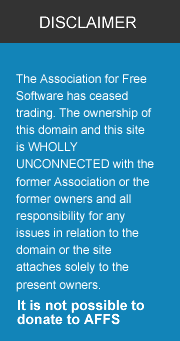Please note in order to retain the flavour of AFFS's work below are direct copies of AFFS message on Government Workshops within the free software arena. We have included original links.
Government Workgroup
The association wants to get the benefits of Free Software recognised by politicians of all parties and persuasion. This is vital if we are to achieve our constitutional aim and ensure the legal viability of Free Software in the UK, despite growing pressures from proprietary producers.
Consultations
Supporters are encouraged to respond to:
•the EC consultation on copyright and neighbouring rights (before 31 October 2004, email reply possible)
We would like help drafting our reply with this, too. Please contact us to offer help - Alex Hudson has a proposed response in draft form, which we can point you towards.
•MPs and MEPs about software patents and how IPR issues could harm UK software development;
It is particularly helpful if relevant bodies reply, such as companies to DTi consultations, but it is nearly always helpful for individuals to respond too.
Please contact us if there are consultations we're not listing.
Recent developments
The OST ran a consultation about the seventh EU framework programme (closed late July).
Richard Smedley's article "The price of freedom" was published in Public Service Review: Central Government.
We sent a letter about the "IPRED" proposed EU directive to MEPs.
The Department of Trade and Industry published an Innovation Report which includes a section on "intellectual property" (a confusing term for copyrights, patents, trademarks and other matters).
The Office of the Deputy Prime Minister-funded APLAWS project released code under the GPL
The chief executive of the Office for Government Commerce commented at a Public Accounts Committee session. We also discovered how much Department For International Development pays Microsoft.
Actors
There are many government departments affecting free software. When we learn enough about them, they are documented here. Please help us to complete and improve this list.
UK Government
The scope of the association is the UK and so this is the government we expect to deal with most frequently. There are many different components within the UK government.
Dept of Trade and Industry
The DTi works with businesses, employees and consumers. It offers some research grants which have influenced free software. It runs consultations on its policies.
Office of Science and Technology
This is part of the DTi which advises about science and technology. It ran a consultation about EU funding programmes that could fund free software. It also publishes some DTi news and consultations.
Patent Office
UKPO is a trading fund that reports to a minister in the DTi (source: Patent Office Trading Fund Order 1991 They run consultations and have been active about software patents. Some AFFS members feel that UKPO reliance on income causes its work to be biased and trading funds should not be involved in policy-making that affects their income, even running consultions.
e-Government Unit
This is part of the Cabinet Office, with a wide range of tasks about IT and government that can affect free software. The e-Government unit's GovTalk site publishes standards (including ones covering "open source software") and consultations.
Office of Government Commerce
An independent office of the Treasury which tries to improve the efficiency and effectiveness of central civil government procurement, and assists in setting up centres of excellence in deparments. Their news page should carry further information when it appears.
While not part of the government, most people associate the UK Parliament closely with it, because the government is usually formed by the party with most MPs in the parliament's House of Commons. We elect MPs to House of Commons in general elections, one member for each election area. Its processes mostly examine new laws, government actions and current events. Laws need not be drafted by government, but usually are. Sites such as They Work For You .com and Fax Your MP make it easier to observe and contact MPs.
There is a Parliamentary Office of Science and Technology which provides analysis of public policy to parliament. This is a different office to the DTi's OST mentioned above.
EU institutions
The UK is a member of the European Union. The decision-making process is very different to the UK government. Free software seems most affected by Internal Market and Information Society initiatives.
Our associate FSF Europe has some projects connected with the EU. We often look to FSFE to coordinate or lead EU-related actions.
The Belgian Free Electronic Association (Association Electronique Libre, AEL) have a guide to lobbying MEPs about software patents. It might be a good inspiration for lobbying MEPs on any topic.
 DISCLAIMER
DISCLAIMER
